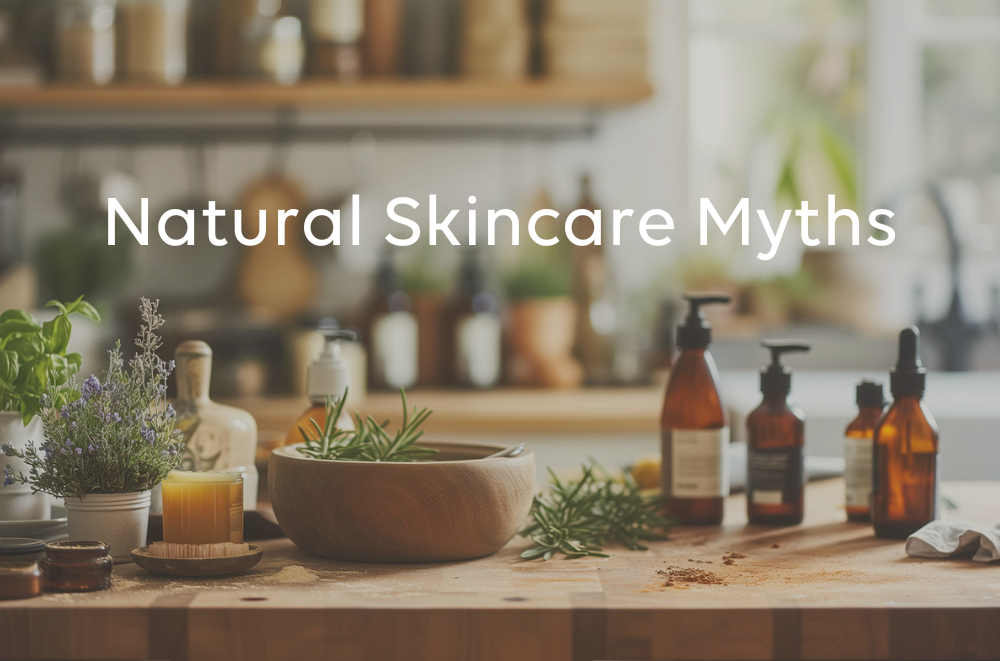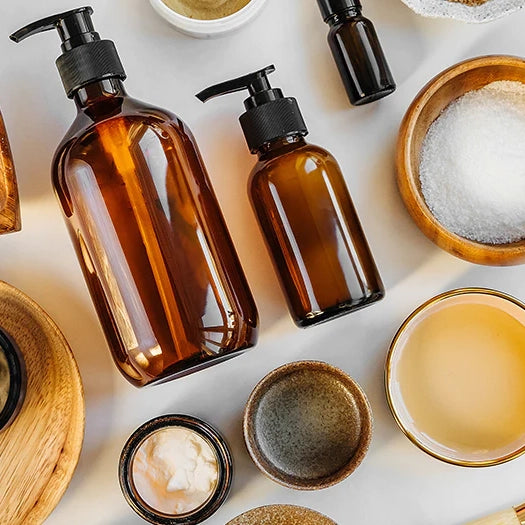
In the years we’ve spent researching and working with natural and organic products to create effective and nourishing skincare, we’ve come across a few myths and misconceptions.
Here’s a few that we hope to debunk to help you make more informed choices about your skincare routine.
-
Natural Skincare Isn’t as Effective as Chemical-Based Products:
One of the most persistent myths about natural skincare is that it's not as effective as its chemical-based counterparts. However, this couldn't be further from the truth. Natural skincare products often contain potent ingredients derived from plants, fruits, and herbs that have been used for centuries for their skincare benefits. Ingredients like hyaluronic acid, vitamin C, and retinol can be found in natural skincare formulations, offering effective solutions for various skin concerns. Natural ingredients have been shown to be highly effective due to their rich antioxidants, vitamins and minerals.
-
Natural Skincare is Always Safe:
Unfortunately, there’s a misconception that just because it’s natural, it must be inherently safe. In reality, some natural ingredients can cause allergic reactions or irritations, especially for those with sensitive skin or specific allergies.
While natural skincare products tend to use ingredients that are considered safer and less likely to cause irritation than synthetic chemicals, it's essential to remember that natural doesn't always mean safe for everyone. It's crucial to patch-test new products and consult with a dermatologist if you have any concerns about potential reactions.

-
Natural and Organic Mean the Same Thing:
There can sometimes be confusion between the terms “natural” and “organic” with many people believing they are interchangeable.
We take a deep dive into how to make sure your skincare products are truly natural and organic and why certifications are important in a previous post. It’s a great read if you are interested in assessing if the products you buy are truly natural or organic.
“Natural” generally refers to ingredients derived from natural sources without synthetic additives, while “organic” pertains to how the ingredients are grown and processed, adhering to specific regulatory standards. Put simply, natural skincare products contain ingredients derived from nature, organic skincare products are made with ingredients grown without synthetic pesticides, herbicides, or fertilizers. Organic certification ensures the ingredients used meet strict standards set by certification bodies.
-
Natural Skincare is Always Expensive and Inaccessible:
It’s often believed that natural skincare products are costly and hard to find. Thankfully, with the rise of DIY skincare and the increase in market demand, there are more affordable and accessible options.
While some natural skincare brands may carry a higher price tag, there are plenty of affordable options available on the market today. Additionally, many natural skincare ingredients can be found in your kitchen pantry, making at-home DIY skincare solutions not only accessible but budget-friendly.
-
Natural Skincare Can’t Address Specific Skin Concerns:
Some people think natural skincare products are too gentle to address specific skin issues such as acne, eczema or the signs of aging. In reality, natural ingredients offer a wide range of benefits for various skin types and concerns.
Natural skincare ingredients like tea tree oil, witch hazel, and salicylic acid derived from willow bark are renowned for their anti-inflammatory and antibacterial properties. These ingredients can help reduce acne-causing bacteria, unclog pores, and calm redness and inflammation without the harsh side effects often associated with synthetic ingredients like benzoyl peroxide.
Many natural skincare ingredients are also rich in antioxidants, vitamins, and essential fatty acids that help combat the signs of aging. For example, vitamin C derived from citrus fruits helps to brighten the skin, reduce the appearance of fine lines and wrinkles, and protect against environmental damage. Other ingredients like rosehip oil, rich in vitamin A and fatty acids, promote cell turnover and improve skin texture and elasticity.
Whatever skin issue you hope to address, there are natural solutions available to improve not just the appearance, but the health of your skin.

-
Natural Skincare is Just a Trend:
Some may believe natural skincare is merely a passing trend without substantial backing. In fact, choosing natural products is a lifestyle choice that reflects a long-term commitment to sustainable and effective beauty practices.
While the popularity of natural skincare may ebb and flow, the principles behind it—using ingredients derived from nature to nourish and care for the skin—have been practiced for centuries. Natural skincare is more than just a passing trend; it's a timeless approach to skincare that prioritises health and sustainability.
-
DIY Natural Skincare is Always Better:
This is one I’m passionate about. I am a huge advocate for making skincare at home and as visitors to nood mood would know, we sell a range of complete skincare kits so that people can start their DIY journey with tried and tested formulas to create lovely natural products.
BUT - not all DIY recipes are created equal. In fact, not all homemade recipes are safe or effective! Formulating effective and safe skincare requires a deep understanding of ingredient interactions, stability and efficacy.
DIY skincare can also carry risks if ingredients are not properly sourced or measured, leading to potential skin irritation or other adverse reactions.
Please be sure to educate yourself on the properties, benefits, and potential risks of each ingredient before incorporating them into your DIY skincare recipes. Make sure you consult reputable sources for guidance. For further reading, check our article about the potential risks and considerations for DIY skincare and why it’s essential to be mindful when embarking on your at-home skincare journey.
-
Natural Skincare Products are Always Better:
Following on from the misconception that DIY is better, is the belief that natural or organic products, by their very nature, are superior to synthetic ones. However, the efficacy of a skincare product, whether natural or synthetic, depends on its formulation, quality and the concentration of active ingredients.
While natural skincare products offer many benefits, they may not always be the best choice for every individual or skin concern. It's essential to consider factors such as your skin type, specific concerns, and ingredient sensitivities when choosing skincare products. Ultimately, the best skincare routine is one that is tailored to your unique needs and preferences, whether that includes natural, synthetic, or a combination of both.
Natural skincare products have much to offer in terms of effectiveness, safety, and accessibility. However, it’s incredibly important that you conduct thorough research and possibly consult skincare professionals before fully transitioning to or formulating your own natural skincare products. We hope to help you along the way to ensure you have the opportunity to embrace the benefits of natural skincare for healthier, happier skin.





